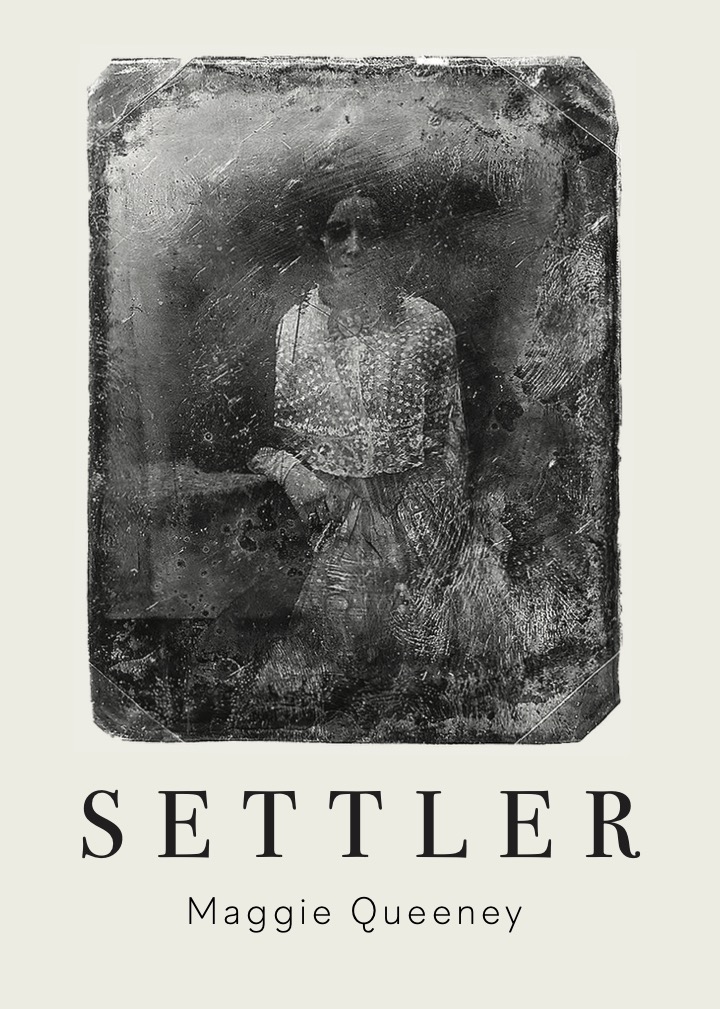 Review by Miriam Calleja
Review by Miriam Calleja
Settler
by Maggie Queeney
Tupelo Press
ISBN: 978-1-946482-63-1, Paperback, Dec 2021
Poetry often makes me question the meaning of familiar words, so when I look up the word ‘settler’, having made it foreign through poetry, I find a prickly metaphor in “one who makes a previously uninhabited place his home.”
These are not comfortable poems. Queeney is succinct from the very start, from an index that indicates vast topics that almost lure us into the book, not knowing what we might find. There is a precision in the choice of words, especially in the line breaks, which are exquisitely and perhaps painfully sewn into place.
We unkept, unkeeping, we take
Space, knead and bake, cut loam and bury
The blind seed
and later
Our loss
Part of the larger design
If I imagine these poems written on canvas, I think of them as “blood-anointed.” Queeney bears witness and makes frank the realities of these women, or the female experience that may read removed but isn’t always entirely separate from us today.
In the darkening house, the feeding lengths
Of wood to stove, parabolic needle
And thread to mend the tearing
Wearing out emptying clothes
The sewing jargon is not only clever but appropriate, maybe indicating stitching together to make do. And in a new place, there are many natural enemies, especially at first, and make do you must.
There is a texture sewn into these struggles that you would not always expect from sonnets. Yet Queeney moulds the form to suit her needs, so you might not notice you’re reading fourteen lines on each page. I found myself drawn to words I’d read a million times before as though they were new wondrous creatures, questioning what I knew.
Unraveling threads expose
The unbroken wax of unsunned skin
It is no coincidence that other reviewers use words like ‘bewitched’ and ‘haunting’ because it is indeed a spell that Queeney casts not only with the poems as a whole but with the flexibility of words, sometimes repeating a word in a different position so that poems respond to one another. As they echo, they change, a reflection that feels like a journey. An example from the poem Mirror demonstrates the skill
Among the soft foxing of frost spots
The word ‘settling’ itself is a double-edged sword. It draws on a feeling of making do (and giving up), but it also signifies that the desired end has been achieved. The term in itself conceals as it explains, and so does every poem title in this collection. Although few words do this in the English language in normal speak, Queeney twists meaning in Settler with her wordsmithery and the use of compound words, augmenting and qualifying with line-breaks that finally reveal naked truths.
The clothes thin
For the next, and, in the dark, skirts
Pulled into burrows about our waists,
Future dead are drawn from our body.
It is a book not for the faint-hearted. The collection captures the grittiness of human experience in a condensed space. I don’t know if the intention was to break hearts, but in its darkness, it shines a light on what needs to be seen. And that, after all, is what we want from poetry.
About the reviewer: Miriam Calleja is the bilingual author of poetry collections Pomegranate Heart (EDE Books, 2015) and Inside Skin (a two-book series in collaboration with a lith photographer, EDE Books 2016). During the pandemic, her long poem ‘Remember’ was recorded and published as a memento of these times. It was presented during Versopolis: Festival of Hope online. Her most recent poetry collections are Stranger Intimacy (Stamparija Reljic, 2020) and the collaborative art book Luftmeer (2021) published in Maastricht. Holland.